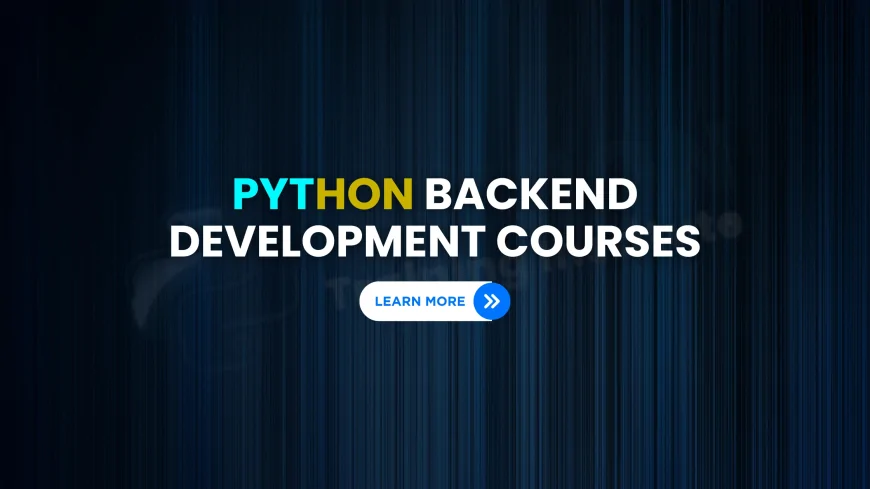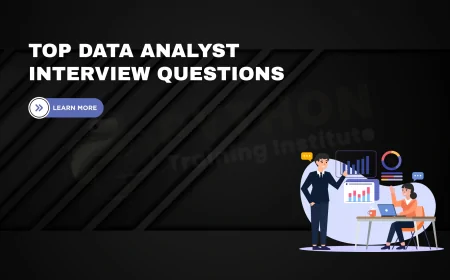Python Backend Development Courses Pune | Top Python Backend Training Institutes in Pune
Explore top Python backend development courses in Pune with Django, Flask, REST API training, certifications, and placement support.

Table of Contents
- Introduction
- Why Python for Backend Development?
- Career Scope in Python Backend Development
- Key Features of Backend Python Courses in Pune
- Typical Curriculum Covered
- Top Python Backend Development Institutes in Pune
- Online vs. Offline Python Backend Classes
- Benefits of Python Backend Certifications
- Who Should Join These Courses?
- Course Fees and Duration
- Internships and Placement Assistance
- Real-World Projects and Case Studies
- FAQs
- Conclusion
Introduction
"Pune’s thriving tech ecosystem is fueling a sharp rise in demand for skilled Python backend developers." Python backend development courses teach you to build powerful web applications, REST APIs, and scalable systems using frameworks like Django, Flask, and FastAPI.
Why Python for Backend Development?
- Easy-to-learn syntax
- Popular frameworks: Django, Flask, FastAPI
- Scalable and secure architecture
- Cloud and database integration support
- Strong developer community
Career Scope in Python Backend Development
Python backend developers are in demand across industries. Job roles include:
- Backend Developer
- API Engineer
- Python Software Developer
- Full Stack Developer
- DevOps Associate
Salary range: ₹4–6 LPA for freshers; ₹8–15 LPA for experienced professionals.
Key Features of Backend Python Courses in Pune
- Live projects and real-world assignments
- Expert trainers and mentors
- Job assistance and internship opportunities
- Flexible learning modes (weekend/online)
- Hands-on with Git, Docker, PostgreSQL
Typical Curriculum Covered
- Python Basics & OOPs
- Web Frameworks: Django, Flask
- Database integration
- RESTful API development
- Authentication (JWT, OAuth)
- Testing & Debugging
- Docker & Git
- Deployment to Heroku/AWS
Top Python Backend Development Institutes in Pune
- Webasha Technologies Pune: Offers comprehensive Python backend development training, emphasizing frameworks like Django, Flask, and RESTful API integration for real-world applications.
Online vs. Offline Python Backend Classes
| Mode | Features |
|---|---|
| Online | Flexibility, recordings, ideal for working professionals |
| Offline | Hands-on mentorship, peer networking |
| Hybrid | Combination of both modes |
Benefits of Python Backend Certifications
- Enhances your resume
- Industry validation of your skills
- Helps in job interviews and freelance gigs
Who Should Join These Courses?
- Engineering students and freshers
- Working professionals wanting to upskill
- Startup founders and freelancers
- Non-CS graduates aiming for a career switch
Course Fees and Duration
| Institute | Duration | Fees (Approx.) |
|---|---|---|
| Ethans Tech | 2.5–3 months | ₹15,000 – ₹20,000 |
| SevenMentor | 3–4 months | ₹18,000 – ₹22,000 |
| Webasha | 2.5 months | ₹14,000 – ₹18,000 |
| Imarticus Learning | 4 months | ₹25,000 – ₹30,000 |
Internships and Placement Assistance
- Live projects
- Mock interviews
- Resume and LinkedIn optimization
- Placement drives and referrals
Real-World Projects and Case Studies
- E-commerce backend system
- Hospital management API
- Job portal using Django
- Social media-like API app
FAQs –
1. What is backend development in Python?
Backend development in Python involves building the server-side logic of web applications using frameworks like Django and Flask. It handles database communication, API integration, authentication, and server-side processing.
2. Which is better for backend development – Django or Flask?
Django is better for large, structured applications due to its full-featured framework, while Flask is lightweight and ideal for microservices or small-scale apps. Both are widely used and respected in the industry.
3. Do I need to learn frontend development to become a Python backend developer?
No, frontend knowledge is not mandatory, but understanding HTML, CSS, and JavaScript basics can help you collaborate better with frontend teams or work as a full-stack developer.
4. What are REST APIs and why are they important in backend development?
REST APIs (Representational State Transfer) allow communication between client and server using HTTP requests. They are essential for building scalable, decoupled systems and are a core skill in backend development.
5. Which are the top institutes for Python backend courses in Pune?
Top institutes include Ethans Tech, Webasha Technologies, SevenMentor, CodeKul, and Imarticus Learning. These offer hands-on backend training with job support and certifications.
6. Are job placement services offered with these courses?
Yes, many Python backend courses in Pune provide placement assistance, resume-building, mock interviews, and direct recruitment through hiring partners.
7. Will I work on real-time projects during the course?
Yes, most courses include real-world projects like e-commerce platforms, blog engines, and RESTful APIs, helping students gain practical backend development experience.
8. Can someone with no programming background join a backend Python course?
Absolutely. Many backend development courses are beginner-friendly and include fundamental Python programming to help non-programmers get started.
9. What tools are commonly used in backend Python development?
Popular tools include Git, Docker, PostgreSQL/MySQL, Postman for API testing, VS Code, and cloud platforms like AWS or Heroku for deployment.
10. What is the average salary for a Python backend developer in Pune?
Entry-level Python backend developers in Pune earn between ₹4 to ₹6 LPA, while experienced professionals can earn upwards of ₹10 to ₹15 LPA, depending on skills and experience.
11. Is backend Python development good for freelancing?
Yes, many freelancers build APIs and backend systems for startups, SaaS tools, and small businesses using Python, especially with Flask and Django.
12. Are weekend and evening batches available?
Yes, most institutes in Pune offer flexible schedules including weekend and evening batches to accommodate working professionals and students.
13. Do these courses include FastAPI training?
Some advanced courses include FastAPI, which is a modern, high-performance web framework. It's ideal for building fast, production-ready RESTful APIs.
14. Do I get a certificate after completing the course?
Yes, institutes provide course completion or industry-recognized certificates which enhance your professional credibility and job prospects.
15. Can I become a full-stack developer after a backend course?
Yes, by learning frontend technologies (HTML, CSS, JavaScript, React), you can extend your backend knowledge to become a full-stack developer.
16. Are online Python backend classes as effective as offline?
Online classes offer flexibility and are just as effective, provided the course includes live coding sessions, mentor interaction, and project work.
17. Is Python backend still in demand in 2025?
Yes, Python remains one of the top choices for backend development due to its robust frameworks, easy syntax, and strong community support.
18. How many projects will I build during the course?
You typically work on 3 to 5 hands-on projects, including API creation, authentication systems, and data-driven applications.
19. What databases are covered in these courses?
Commonly taught databases include PostgreSQL, MySQL, SQLite, and sometimes MongoDB for understanding NoSQL concepts.
20. Can I deploy my backend applications to the cloud in the course?
Yes, deployment to platforms like Heroku, AWS, or PythonAnywhere is usually part of the syllabus, helping you understand cloud infrastructure and DevOps basics.
Conclusion
Python backend development is a promising career path, especially in Pune's dynamic IT market. With strong community support, job-ready frameworks like Django, and full-fledged project exposure, these courses prepare you for real-world software engineering roles. Choose a course that offers hands-on training, certifications, and placement support to build a successful tech career.
What's Your Reaction?
 Like
0
Like
0
 Dislike
0
Dislike
0
 Love
0
Love
0
 Funny
0
Funny
0
 Angry
0
Angry
0
 Sad
0
Sad
0
 Wow
0
Wow
0















